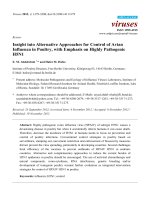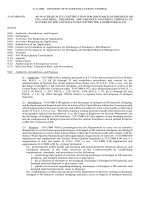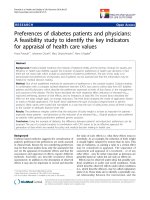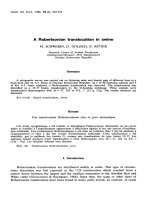The present investigation was carried out for appraisal of antioxidative strategies in the erythrocytes of Marwari sheep during moderate, hot and cold ambiences.
Bạn đang xem bản rút gọn của tài liệu. Xem và tải ngay bản đầy đủ của tài liệu tại đây (429.34 KB, 7 trang )
Int.J.Curr.Microbiol.App.Sci (2020) 9(2): 2965-2971
International Journal of Current Microbiology and Applied Sciences
ISSN: 2319-7706 Volume 9 Number 2 (2020)
Journal homepage:
Original Research Article
/>
Appraisal of Antioxidative Strategies in the Erythrocytes of Marwari
Sheep during Extreme Ambiences
Deeksha* and Nalini Kataria
Department of veterinary physiology, College of Veterinary and Animal Science, Rajasthan
University of Veterinary and Animal Sciences, Bikaner 334001, India
*Corresponding author
ABSTRACT
Keywords
MarwariSheep,
antioxidative
strategies,
antioxidants,
superoxide
dismutase,
glutathione
reductase
Article Info
Accepted:
20 January 2020
Available Online:
10 February 2020
The present investigation was carried out for appraisal of antioxidative
strategies in the erythrocytes of Marwari sheep during moderate, hot and
cold ambiences. Haemolysates were prepared to determine antioxidants.
Antioxidants included Superoxide Dismutase (SOD) andGlutathione
Reductase (GR).Results revealed mean values of superoxide dismutase
(SOD) and glutathione reductase (GR) in erythrocytes were significantly
(p≤0.05) higher during hot and cold ambiences as compared to respective
moderate mean value. The mean values were significantly (p≤0.05) higher
in male animals in all the ambiences. Age effect showed a significant
(p≤0.05) increase in the mean values of both indicators being highest in the
sheep of 18-24 months of age. On the basis of pattern of observations
obtained in the present study, it was appraised that definitive strategies are
present in the animals and during adverse conditions modulations occur to
combat the stress.
Introduction
Antioxidative strategies are present inside the
cells in the form of
various endogenous
antioxidative enzymes, antioxidants and free
radical
scavengers.
Erythrocytes
are
constantly subjected to oxidative stress, from
their role as an oxygen transporter. Since
oxidized
erythrocyte
components
are
antigenic in regards to the formation of auto
antibodies, a long-term exposure to severe
oxidative stress consequently causes an
autoimmune
response
to
oxidized
erythrocytes that can be regarded as an
oxidative modification (Iuchi et al., 2007).
An important consequence of an imbalance
between the erythrocytes’s components is the
poor ability to cope with oxidative stress,
which can result in degenerative changes in
2965
Int.J.Curr.Microbiol.App.Sci (2020) 9(2): 2965-2971
haemoglobin, cell membrane and enzymes
required for normal erythrocytic function
(Edwards and Fuller, 1996).Oxidative stress
induces impairment of energy metabolism of
erythrocytes (Tavazzi et al., 2001).Heat stress
modulates metabolic reactions through free
radicals and produces oxidative stress
(Kataria et al., 2010).Indicators of oxidative
stress allow the assessment of real status of
physiological defenses and prevention of the
appearance
of
correlated
pathologies
(Piccione et al., 2007).
Oxygen can be converted to hydrogen
peroxide
by
superoxide
dismutase.
Glutathione reductase utilizes NADPH to
convert oxidized glutathione to reduced
glutathione. Reduced glutathione is then
oxidized back to oxidized glutathione.
Glutathione peroxidase in a cyclical reaction
neutralize hydrogen peroxide into water and
oxygen. Reduced glutathione also protects
hemoglobin by preventing and reversing
oxidation(Iuchi et al., 2007).
Many compounds have the potential to cause
oxidative stress in erythrocytes. Oxidative
stress is one of the factors proposed to be
responsible for damage of erythrocytes during
and after exercise or stress. The impact of
oxidative stress after acute exhaustion on
erythrocyte damage has been extensively
investigated in rats and humans but there is
paucity of similar type of research in
ruminants. Erythrocytes are one of the first
cells to be affected by changes in the redox
status of the body.
Therefore, alterations in red blood cells are
widely used in first step-diagnoses of a
number of pathological conditions (Pandey
and Rizvi, 2011). Marwari breed of sheep
constitutes a major portion of the sheep
population
in
Western
part
of
Rajasthan.Changes in enzymes necessary for
physiological adjustments are brought about
by great fluctuations in ambient temperatures
during extreme ambiences. Timely detection
of oxidative stress due to extreme ambiences
is an appropriate field of investigation to
explore adaptive physiological measures of
the animals and their use in health
management and clinical diagnosis.
Materials and Methods
Three hundred and sixty blood samples of
apparently healthy Marwari sheep of both
sexes ageing 6 months to 24 months were
collected from private slaughter houses in and
around Bikaner district, Rajasthan during
moderate, hot and cold ambiences. Blood
samples were collected during slaughtering.
In each ambience 120 blood samples were
collected and the animals were grouped into
male (60) and female (60).Moderate
ambience was comprise of OctoberNovember; hot ambience of May and June
and cold ambience of December-January. To
assess the effect of hot and cold ambiences on
the parameters of antioxidative strategies in
the erythrocytes of Marwari sheep, the result
of various parameters analysed was compared
with those analysed during moderate months
serving as control. Following indicators were
analysed to appraise the antioxidative
strategies in erythrocytes:
1. Superoxide Dismutase (SOD)
2. Glutathione Reductase (GR).
Various computer programmes were used to
determine means and standard error
() and analyses
of variance (www.danielsoper.com) to test the
significance of the effects of ambiences, sex
and age groups and correlations (Kaps and
Lamberson, 2004).The changes in the means
were measured by using multiple mean
comparison procedures. For this Duncan’s
new multiple range test was used (Duncan,
1955).
2966
Int.J.Curr.Microbiol.App.Sci (2020) 9(2): 2965-2971
Results and Discussion
Superoxide dismutase (SOD)
The mean overall value of SOD in
erythrocytes of Marwari sheep during
moderate ambience (control) was 2.50±0.008
kU gHb-1. It was obtained from 120 Marwari
sheep irrespective of sex and age. The range
was 2.0-3.0 kU gHb-1. The mean values of
superoxide dismutase in erythrocytes were
significantly (p≤0.05) higher during hot and
cold ambiences as compared to moderate
overall mean value. A highly significant
(p≤0.01) effect of variation in ambience was
also observed by analysis of variance.These
results corroborated the earlier findings
carried out by Chaturvedi (2011) in goats and
Abhimanu (2013) in buffalo calves for SOD
status in erythrocytes. The values obtained in
erythrocytes were lower than those reported
for serum (Kataria et al., 2010 and Joshi,
2012). In present study the higher values of
erythrocytic SOD during extreme ambiences
were probably to scavenge the free radicals
produced, as high ambient temperature is
known to stimulate excessive production of
free radicals especially super oxide anion
radicals and hydrogen peroxide (Siva Kumar
et al., 2007). Hot ambience induced oxidative
stress was confirmed on the basis of higher
activity of SOD during summer or hot
environmental temperature by Bernabucci et
al., (2002) and Kataria et al., (2010). Reports
on cold ambient temperature associated
changes are few.
The sex and age effects were significant
(p≤0.05) in moderate, extreme hot and cold
ambiences. The mean values were
significantly (p≤0.05) higher in male animals
than female animals in all the ambiences. Age
effect showed a significant (p≤0.05) increase
in the mean values being highest in the sheep
of 18-24 months of age. Highly significant
(p≤0.01) sex and age effects were revealed by
analysis of variance. In male animals mean
overall value during hot ambience was 344.82
% and during cold ambience was 148.27 %
higher in comparison to moderate mean
overall value. In female animals mean overall
value during hot ambience was 342.85 % and
during cold ambience was 185.71 % higher in
comparison to moderate mean overall
value.Chaturvedi (2011) and Abhimanu
(2013) also observed sex and age related
changes in SOD status of erythrocytes. Sex
and age related changes in serum SOD values
have been also reported in several animal
species by earlier researchers (Joshi, 2012;
Kataria et al., 2012 and Pandey et al.,
2012).Higher activity in male animals
suggested higher rate of formation of free
radicals. However, Nazifi et al., (2009) did
not observe sex effect on the activity of SOD
in goats. Influence of age on serum SOD
activity was also observed by earlier workers
(Nazifi et al., 2009), who suggested that age
influenced the level of enzyme antioxidant
defense due to generation of free radicals.
Glutathione reductase (GR)
The mean overall value of GR in erythrocytes
of Marwari sheep during moderate ambience
(control) was 1.50±0.03 kU gHb-1. It was
obtained from 120 Marwari sheep irrespective
of sex and age. The range was 1.42-1.60 kU
gHb-1. The mean values of glutathione
reductase in erythrocytes were significantly
(p≤0.05) higher during hot and cold
ambiences as compared to moderate overall
mean value.
A highly significant (p≤0.01) effect of
variation in ambience was also observed by
analysis of variance. It was observed that
increase in the values during hot ambience
was greater than that of cold ambience. The
mean overall value during hot ambience was
42.22 % higher in comparison to cold
ambience mean overall value. Mean overall
value during hot ambience was 113.3% higher
whereas during cold ambience 50 % higher in
2967
Int.J.Curr.Microbiol.App.Sci (2020) 9(2): 2965-2971
comparison to moderate mean overall
value.These results corroborated the earlier
findings carried out by Chaturvedi (2011) in
goats and Abhimanu (2013) in buffalo calves
for SOD status in erythrocytes. The values
obtained in erythrocytes were lower than
those reported for serum (Kataria et al., 2010;
Joshi, 2012 and Pandey, 2012).Glutathione
reductase helps the body to counteract
oxidative stress generated due to hot and cold
ambient temperatures.
6.60
2.50
SOD
(kU gHb-1)
Moderate
ambience
Extreme hot
ambience
11.10
Extreme
cold
ambience
Fig.1 Mean changes in superoxide dismutase (kU gHb-1, SOD) overall values in the
erythrocytes of Marwari sheep during extreme ambiences
Male
SOD (kU gHb-1)
14
12
Female
10
6-12
months
12-18
months
18-24
months
8
6
4
2
0
Moderate ambience
Extreme hot ambience
Extreme cold ambience
Fig.2 Mean changes in superoxide dismutase (kU gHb-1, SOD) values according to sex and age
groups in the erythrocytes of Marwari sheep during extreme ambiences
2968
Int.J.Curr.Microbiol.App.Sci (2020) 9(2): 2965-2971
2.25
1.50
GR
(kU gHb-1)
Moderate
ambience
Extreme hot
ambience
3.20
Extreme cold
ambience
Fig.3 Mean changes in glutathione reductase (kU gHb-1, GR) overallvalues in the erythrocytes
of Marwari sheep during extreme ambiences
Male
GR (kU gHb-1)
3.5
Female
3
2.5
6-12
months
2
12-18
months
1.5
1
18-24
months
0.5
0
Moderate
ambience
Extreme hot
ambience
Extreme cold
ambience
Fig.4 Mean changes in glutathione reductase (kU gHb-1, GR) values according to sex and age
groups in the erythrocytes of Marwari sheep during extreme ambiences
The role of glutathione reductase as
erythrocyte antioxidant systems to overcome
peroxide challenge is well understood (Walsh
et al., 1993 and Kurata et al., 1993). Kataria
et al., (2010) also observed significantly
(p≤0.05) higher serum GR activity during hot
environmental condition as compared to
moderate condition in Marwari goats and
concluded that hot environmental condition
can produce oxidative stress by modulation of
physiological mechanisms in response to heat
stress. The sex and age effects were
significant (p≤0.05) in moderate, extreme hot
and cold ambiences. The mean values were
significantly (p≤0.05) higher in male animals
than female animals in all the ambiences. Age
2969
Int.J.Curr.Microbiol.App.Sci (2020) 9(2): 2965-2971
effect showed a significant (p≤0.05) increase
in the mean values being highest in the sheep
of 18-24 months of age. In male animals
mean overall value during hot ambience was
110.45 % and during cold ambience was
49.01 % higher in comparison to moderate
mean overall value. In female animals mean
overall value during hot ambience was 116.32
% and during cold ambience was 51.02 %
higher in comparison to moderate mean
overall value. Chaturvedi (2011) and
Abhimanu (2013) also observed sex and age
related changes in GR status of erythrocytes.
Sex and age related changes in serum GR
values have been also reported in several
animal species by earlier researchers (Joshi,
2012; Kataria et al., 2012 and Pandey et al.,
2012). Higher activity in male animals
suggested higher rate of formation of free
radicals. Pinto and Bartley (1969) reported
influence of sex and age on GR activity in
rats, the values being higher in adults and in
females whereas Braven et al., (1989) did not
find effect of sex and age on GR activity in
humans.
References
Abhimanu. (2013). Hot ambience associated
variations in erythrocyte and plasma
free radical scavengers of buffalo
calves. M.V.Sc. thesis in Veterinary
Physiology, submitted to Rajasthan
University of Veterinary and Animal
Science, Bikaner, Rajasthan.
Bernabucci, U.; Ronchi, B.; Lacetera, N. and
Nardone, A. (2002). Markers of
oxidative status in plasma and
erythrocytes of transition dairy cows
during hot season. J. Dairy Sci.
85(9):2173-2179.
Braven, J.; Ansari, N.; Figgitt, D.P.; Fisher,
A.; Luders, C.; Hickling, P. and
Whittaker, M. (1989). A comparison of
glutathione reductase and glutathione
peroxidase activities in patients with
rheumatoid arthritis and healthy adults.
Br. J. Rheumatol. 28(3):212-215.
Chaturvedi, M. (2011). Free radical
scavengers and associated analytes in
erythrocytes of Marwari goat during
extreme ambiences. M.V.Sc. thesis in
Veterinary Physiology, submitted to
Rajasthan University of Veterinary and
Animal Science, Bikaner, Rajasthan.
Edwards, C.J. and Fuller, J. (1996). Oxidative
stress in erythrocytes. Comp. Haematol.
6:24-31.
Joshi, A. (2012). Ambience associated
variation in serum biomarkers of
oxidative stress in buffalo of arid tract.
M.V.Sc.
thesis
in
Veterinary
Physiology, submitted to Rajasthan
University of Veterinary and Animal
Science, Bikaner, Rajasthan.
Kaps, M. and Lamberson, W.R. (2004).
Biostatics for animal science. CABI
Publishing. Oxford shire. pp: 36-270.
Kataria, A.K.; Kataria, N. and Maan, R.
(2010). Correlation of serum IgE with
stress in Indian dromedaries affected
with skin wounds J. of Stress Physiol.
and Biochem. 6(3):17-24.
Luchi, Y.; Okada, F.; Onuma, K.; Onoda, T.;
Asao, H.; Kobayashi, M. and Fujii, J.
(2007). Elevated oxidative stress in
erythrocytes due to SOD1 deficiency
causes
anaemia
and
triggers
autoantibody production. Biochem. J.
402:219-227.
Nazifi, S.; Saeb, M.; Baghshani, H. and Saeb,
S.
(2009).
Influence
of
road
transportation during hot summer
conditions
on
oxidative
status
biomarkers in Iranian dromedary camels
(Camelus
dromedarius).
Afr.
J.
Biochem. Res. 3(7):282-287.
Pandey, K.B. and Rizvi, S.I. (2011).
Biomarkers of oxidative stress in red
blood cells. Biomed Pap Med Fac Univ.
Palacky Olomouc Czech Repub.
2970
Int.J.Curr.Microbiol.App.Sci (2020) 9(2): 2965-2971
155(2):131-136.
Pandey, N. (2012). Free radical scavengers
and associated analytes in the serum of
Marwari
goat
during
extreme
ambiences. M.V.Sc. thesis in Veterinary
Physiology, submitted to Rajasthan
University of Veterinary and Animal
Sciences, Bikaner, Rajasthan.
Pandey, N.; Kataria, N.; Kataria, A.K.; Joshi,
A.; Sankhala, L.N.; Asopa, S. and
Pachaury,
R.
(2012).
Extreme
ambiences
vis-à-vis
endogenous
antioxidants of Marwari goat from arid
tracts in India. Extreme Life, Biospeol.
and Astrobiol. 4 (2):29-33.
Piccione, G.; Borruso, M.; Giannetto, C.;
Morgante, M. and Giudice, E. (2007).
Assessment of oxidative stress in dry
and lactating cows. Acta Agric. Scand
A. 57:101-104.
Pinto, R.E. and Bartley, W. (1969). The
nature of sex-linked differences in
glutathione peroxidase activity and
aerobic oxidation of glutathione in male
and female rat liver. Biochem. J.
115(3):449-456.
Siva, Kumar, A.V.N.; Varshney, V.P.; and
Sastry, K.V.H. (2007). Effect of
antioxidants supplementation on total
antioxidant activity in heat stressed
goat. Indian J. Anim. Nutr. 24: 47-49.
Tavazzi, B.; Amorini, A.M.; Fazzina, G.;
Pierro, D.D.; Tubobene, M.; Giardinal,
B. and Lazzarino, G. (2001). Oxidative
stress Induces Impairment of Human
Erythrocytes
Energy
Metabolism
through the Oxygen Radical-mediated
Direct Activation of AMP-deaminase. J.
Biol. Chem. 276:48083-48092.
How to cite this article:
Deeksha and Nalini Kataria. 2020. Appraisal of Antioxidative Strategies in the Erythrocytes of
Marwari Sheep during Extreme Ambiences. Int.J.Curr.Microbiol.App.Sci. 9(02): 2965-2971.
doi: />
2971









